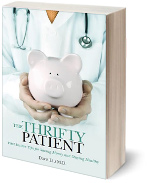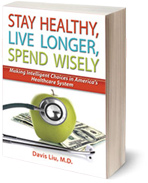ICYMI – In Case You Missed It – March 2016 – for Physicians and Physician Leaders
Always great to get a shout out from CNBC – “The Doctor will Facetime you Now” as well as the SF Chronicle and Buzzfeed regarding my new firm Lemonaid Health!
Lemonaid Health is now in 6 states (CA, NY, MI, PA, FL, and OH) that account for 114 million people or over 35 percent of the country. We provide simple primary care needs like birth control medicine, antibiotics for bladder infections or sinus infections, and five other services and patients love it. (See the reviews). Best viewed on the Chrome web browser. App also available in Apple iOS or Android Google Play app store. Feedback? Email me directly at davis@lemonaid.com.
Health Care
- KP San Diego has a disruptive and innovation mindset. Doctors in the family medicine residency program received the Mobile ECG AliveCor device for their iPhones. AliveCor recently got FDA approval for a computer to analyze the data from this devices and make one of three diagnoses (normal, atrial fibrillation, or noise / interference). Inside an integrated health care system, specialty care and expertise is moved to primary care. Results? Faster diagnoses, treat sooner, and recover sooner resulting in better outcomes and lower costs. This is only the beginning as technologies and monitoring previously found in hospitals become cheaper and available to the public. Women wearing FitBits discovered that a persistently high heart rate was due to an early pregnancy they were unaware about. Who needs a stork?
 Great piece – Social media meet technology in solving health care problems. Figure1 – “Instagram for Doctors”, “It’s like having a colleague in every part of the world to bounce ideas off.” – This Doctor Is Using Telemedicine To Treat Syrian Refugees – Dr. Rogy Masri has a secret weapon: his smartphone. OR consider Human Diagnosis (Dx) Project where doctors, like this TPMG physician, submit cases for others to solve. How do doctors use the data revealed to them to come up with a differential? How might Human Dx use this information to better health care?
Great piece – Social media meet technology in solving health care problems. Figure1 – “Instagram for Doctors”, “It’s like having a colleague in every part of the world to bounce ideas off.” – This Doctor Is Using Telemedicine To Treat Syrian Refugees – Dr. Rogy Masri has a secret weapon: his smartphone. OR consider Human Diagnosis (Dx) Project where doctors, like this TPMG physician, submit cases for others to solve. How do doctors use the data revealed to them to come up with a differential? How might Human Dx use this information to better health care? 
- We’re More Honest With Our Phones Than With Our Doctors – “We look up weird symptoms and humiliating questions on Google with the same ease that we search for the name of a vaguely familiar character actor. For many of us, our smartphones have become extensions of our brains — we outsource essential cognitive functions, like memory, to them, which means they soak up much more information than we realize. When we hand over this information willingly, the effect is even greater.” What’s on your phone?
Outside Health Care
- Love it. Using analytics and technology to allow understaffed Chicago Public Health inspectors do better! They’ve created an algorithm to determine which restaurants are at high risk of having potential food-borne illnesses before it happens. Restaurants that had tobacco licenses were more likely to be compliant. Others in where crime was more prevalent less so. With the algorithm, they “discovered the rate of finding violations increased by 25 percent. That meant, inspectors found violations about seven days earlier than before – a week less of potential exposure for customers based on the algorithm” – Up to code? An algorithm is helping Chicago health officials predict restaurant safety violations. Remind you of the 2002 Tom Cruise film Minority Report?
- What Google Learned From Its Quest to Build the Perfect Team – Psychological safety as noted by Harvard Business School Professor Amy Edmondson is incredibly trait that great teams possess. Google embraced its program Project Aristotle which determined what traits made one team more productive than others. “What Project Aristotle has taught people within Google is that no one wants to put on a ‘‘work face’’ when they get to the office. No one wants to leave part of their personality and inner life at home. But to be fully present at work, to feel ‘‘psychologically safe,’’ we must know that we can be free enough, sometimes, to share the things that scare us without fear of recriminations. We must be able to talk about what is messy or sad, to have hard conversations with colleagues who are driving us crazy. We can’t be focused just on efficiency. Rather, when we start the morning by collaborating with a team of engineers and then send emails to our marketing colleagues and then jump on a conference call, we want to know that those people really hear us. We want to know that work is more than just labor.“
- Can a 3-year old represent herself in immigration court? This judge thinks so. As a doctor I find this completely outrageous. Sadly our society is ignoring science (see anti-vaccination) but now pervading the justice system? Not understanding the ideal gas law is one thing (Deflategate), but failure to understand brain development and child psychology? Unbelievable. Jack H. Weil, a longtime immigration judge who is responsible for training other judges, made the assertion in sworn testimony in a deposition in federal court in Seattle. His comments highlighted the plight of thousands of juveniles who are forced to defend themselves each year in immigration court amid a surge of children from Central America who cross the southwestern U.S. border. “I’ve taught immigration law literally to 3-year-olds and 4-year-olds,” Weil said. “It takes a lot of time. It takes a lot of patience. They get it. It’s not the most efficient, but it can be done.”He repeated his claim twice in the deposition, also saying, “I’ve told you I have trained 3-year-olds and 4-year-olds in immigration law,” according to a transcript. “You can do a fair hearing. It’s going to take you a lot of time.”
- Judgment calls. How do individuals, teams, and organizations make the best decisions? Something I’ve been fascinated with for quite sometime. Whether you agree or disagree with President Obama, The Obama Doctrine – The U.S. president talks through his hardest decisions about America’s role in the world, demonstrates key elements – an iterative process, inquisitive mindset, finding true devil advocates and not simply swayed by prior decisions because it’s always been done that way. Don’t have time to read? Here’s a quick 10 minute highlight from PBS. The challenges our world faces are more complex. The consequences of our decisions more serious.
- Case in point. How do negative interest rates work anyway? Worse Is this a good idea for the world economy or another really bad decision? Where will it lead next? ‘…economists are saying, “Wait a minute. We don’t know how a sophisticated system works with negative interest rates!”
Personal
- I got hacked while writing an Apple-FBI story. This occurred to this USA Today reporter while emailing sources while on a plane. Public wifi is not secure. Follow-up article – What I learned after being hacked in mid-air. Installing VPN on all of your devices might be a good step to keep your private information safe. Perhaps Private Internet Access?
- Baby carrots are not real! Simply effective marketing and a process to make ugly food prettier. “The baby carrot, like so many inventions before it, was birthed by necessity. In the early 1980s, the carrot business was stagnant and wasteful. Growing seasons were long, and more than half of what farmers grew was ugly and unfit for grocery shelves. But in 1986, Yurosek, itching for a way to make use of all the misshapen carrots, tried something new. Instead of tossing them out, he carved them into something more palatable.” Is it time to think differently? Why some see potential in ‘ugly food’. Of course, Northern California leads the way! “While European supermarkets have adopted the ugly foods movement by selling produce with superficial blemishes, most major American chains have refused to embrace the runner-ups in the fruit and veg beauty pageants – until now. Whole Foods Market says it will sell the “ugly” produce that would otherwise go to waste at a handful of its Northern California stores beginning in late April.“
- Just finished reading the book Extreme Ownership: How U.S. Navy SEALs Lead and Win
. Practical guide for new leaders and a quick refresher on the key points of being a leader with specific stories regarding SEAL team missions in Iraq, the important learned principles, and true life business story. My favorite chapters -“Decisiveness amid Uncertainty, Discipline Equals Freedom – The Dichotomy of Leadership”. Next book? Eleven Rings – The Soul of Success, by NBA championship coach Chicago Bulls and LA Lakers Phil Jackson. What books are you reading?
- Also just completed the fabulous free 5 week MOOC (massive open online course) by Stanford Business School Professors Huggy Rao and Robert Sutton – Scaling Up Your Venture Without Screwing Up, which was based on their 2014 book Scaling Up Excellence: Getting to More Without Settling for Less
. Used many of these elements in my previous and current work.
What did i miss? What else would you add?

 Get important exclusive advice and tips on how to save money while staying healthy.
Get important exclusive advice and tips on how to save money while staying healthy. Learn how to make intelligent choices in America's Healthcare System.
Learn how to make intelligent choices in America's Healthcare System.